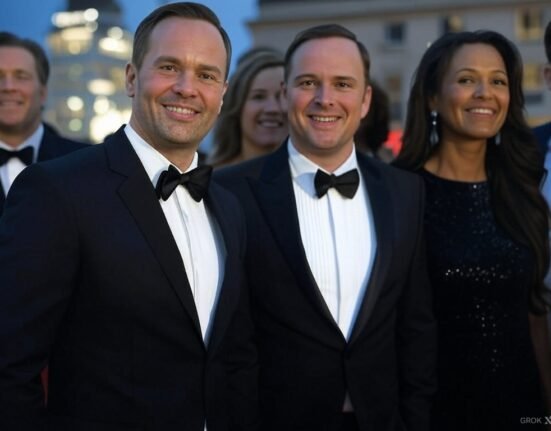The recent announcement regarding Juan Soto’s monumental contract with the New York Mets has undoubtedly marked a watershed moment in the world of sports, and particularly in Major League Baseball (MLB). This staggering agreement, valued at $765 million, is not just the highest contract in baseball history; it is the largest in the realm of professional sports, a benchmark that sets a new precedent for player valuations and organizational commitments. As Soto joins the Mets, the ramifications of this contract are far-reaching, influencing the dynamics of player salaries and team strategies across the league.
Juan Soto, a player renowned for his exceptional hitting and defensive skills, represents not only an invaluable asset for the Mets but also a transformative force for MLB. His arrival in New York may signal the dawn of a new era, characterized by aggressive team-building strategies and elevated competitiveness. For the Mets, the decision to invest such a staggering amount underscores their ambition to compete at the highest levels, putting them on the map as serious contenders in a league where financial muscle often translates to success on the field.
This contract also reflects the evolving landscape of MLB, where the traditional metrics of player evaluation are being redefined. The willingness of franchises to allocate unprecedented sums toward star athletes illustrates a broader trend toward valuing youthful talent and exceptional performance over long-term sustainability. As teams adjust their approaches to player acquisition, the implications for both current players and emerging talent will be profound. As the league continues to adapt, the arrival of Juan Soto heralds not only a new chapter for the Mets but also the beginning of a captivating narrative within the realm of baseball.
Who is Juan Soto? A Career Overview
Juan Soto, a Dominican professional baseball player, has made a formidable name for himself in Major League Baseball (MLB) since his debut. Born on October 25, 1998, Soto’s journey began at a young age, marked by impressive talent that soon attracted the attention of scouts. He signed with the Washington Nationals in 2015, and his ascent to stardom quickly followed.
Soto made his MLB debut in May 2018 at just 19 years old, showcasing his exceptional batting prowess and keen eye for the strike zone. He quickly became known for his ability to hit for both power and average, boasting an impressive on-base percentage that ranks among the top hitters in the league. Over his career, Soto has accumulated remarkable statistics, including multiple seasons with over 30 home runs and an OPS (On-base Plus Slugging) averaging well above .900.
His contributions to the Nationals were pivotal, particularly during the 2019 season when the team clinched its first World Series title. Soto’s performance during the playoffs was stellar; he hit crucial home runs, including a memorable blast in Game 6 of the World Series. His remarkable postseason performance solidified his status not only as a rising star but also as a clutch player on the biggest stage in baseball.
Following his time with the Nationals, Soto was traded to the San Diego Padres in 2022. His tenure with the Padres further established his credentials as one of the league’s premier hitters, gathering accolades and setting records. As he continues his career, Soto’s combination of young talent, statistical achievements, and proven clutch performance solidifies him as a deserving investment for the New York Mets, who see his potential to lead their franchise into a promising future.
The Financial Breakdown: Understanding the $765 Million Deal
The recent $765 million contract signed by Juan Soto represents one of the largest financial commitments in the history of professional sports. This monumental deal spans over 15 years, averaging an annual salary of approximately $51 million. Such financial calculations are not only mind-boggling but also reflective of Soto’s pivotal role in the New York Mets’ aspirations to compete at the highest level. This contract is indicative of the franchise’s commitment to securing talent that can change the trajectory of the team.
Structurally, the deal highlights innovative payment schemes, making room for both immediate and long-term financial strategy. For instance, while an upfront signing bonus is typical in high-value contracts, Soto’s agreement may include deferred payments that help the Mets manage their salary cap and overall financial obligations. This flexibility will allow the franchise to navigate contracts for other players while maintaining a core roster that can support successful campaigns.
To place Soto’s contract in perspective, it outstrips various historic deals in sports, such as the recent 12-year, $426 million contract awarded to Mike Trout by the Los Angeles Angels, which was previously regarded as a benchmark in Major League Baseball contracts. Soto’s financial arrangement signals a new era in sports economics, where player valuation continues to escalate as franchises seek to secure transformative talent. This deal demonstrates a significant advantage for the Mets, poised at a moment in their franchise history that might redefine their market presence and competitiveness.
Ultimately, the financial breakout of Juan Soto’s contract underscores not only the player’s worth but also the changing landscape of professional sports salaries, where extraordinary talent commands extraordinary compensation.
The Mets’ Strategy: Aiming for Dominance
In the pursuit of a championship title, Major League Baseball franchises often seek to bolster their rosters with high-caliber talent, and the New York Mets have taken this concept to the next level with their bold acquisition of Juan Soto. The Mets’ recent performance has been a mixture of highs and lows, but the front office recognized the imperative to enhance competitiveness in the ever-evolving landscape of the league. By signing Soto to a staggering $765 million contract, the Mets are signaling their intent to become a formidable force in the league.
The rationale behind this strategic move encompasses multiple layers. Firstly, the Mets have demonstrated a commitment to winning by prioritizing the acquisition of elite players who can perform at their peak during high-stakes moments. Soto, widely regarded as one of the game’s most dynamic talents, fits seamlessly into this equation. His ability to produce runs, maintain consistent batting averages, and bring an element of excitement to the field aligns perfectly with the Mets’ long-term vision of creating a championship-caliber roster.
Furthermore, the decision to invest heavily in Soto signifies the Mets’ desire to build a winning culture that inspires both players and fans alike. The organization aims to not only compete for playoff berths but to challenge consistently for the World Series title. As such, the signing of Soto serves as a foundational piece in a larger strategy focused on dominance in the National League. This acquisition is indicative of a larger pattern of moves that reflect the Mets’ ambition, with a clear focus on cultivating talent and enhancing team depth for sustained success in the years to come.
Impact on the Balance of Power in New York
The signing of Juan Soto by the New York Mets for a staggering $765 million is a significant move that has profound implications for the balance of power in New York baseball. Traditionally viewed as the underdog in comparison to their crosstown rivals, the New York Yankees, the Mets’ aggressive investment in Soto signals a shift in competitive dynamics within the city. With Soto, a celebrated dual-threat player known for his exceptional batting skills and formidable presence on the field, the Mets are not only enhancing their roster but also positioning themselves as serious contenders in the National League and beyond.
The historic rivalry between the Mets and the Yankees has often dictated the narrative of baseball in New York. The Yankees, with their long-standing success and fan base, have typically overshadowed the Mets in both attendance and championship accolades. However, the acquisition of Soto alters this perception. His illustrious career, which includes multiple All-Star selections and accolades, brings instant credibility and boosts the Mets’ competitiveness against higher-performing teams. Consequently, this deal not only equips the Mets to challenge the Yankees domestically but also potentially places them on a parallel track with the league’s elite teams.
This transaction will intensify the competition in New York, igniting renewed interest among fans and stirring optimism within the Mets’ organization. The prospect of an invigorated Mets team, fueled by Soto’s talents, poses a direct challenge to the Yankees, compelling them to reassess their strategies. This evolving competition may lead to heightened inter-city rivalry games that attract larger audiences, ultimately benefiting both franchises. Indeed, as the Mets position themselves as a formidable force in the league, the balance of power in New York baseball is set for a consequential recalibration.
Reactions from Fans and Analysts
The recent signing of Juan Soto by the New York Mets has elicited a wide array of reactions from various stakeholders including fans, analysts, and other teams within Major League Baseball (MLB). The excitement surrounding Soto, recognized as one of the premier talents in the sport, is palpable as many view this move as a game-changer for the Mets. Fans have taken to social media platforms, expressing their elation at securing a player of Soto’s caliber, who boasts a remarkable track record of performance in both batting average and on-base percentage. The infusion of such talent into the Mets’ lineup is seen as a step towards increased competitiveness within the league.
However, along with the enthusiasm, there are also concerns regarding the implications of Soto’s hefty $765 million contract. Analysts have scrutinized the long-term viability of such a significant financial commitment, questioning whether the investment can yield sustainable success for the Mets. Some express fears about the potential impact on the team’s payroll structure and flexibility in the future, suggesting that allocating a large portion of the budget to a single player may hinder the organization’s ability to build a well-rounded roster over time. The discussion surrounding Soto’s contract also highlighted comparisons with previous high-stake signings within the league, which have often led to mixed outcomes.
Moreover, rival teams are closely monitoring how the Mets navigate this new landscape. Some see this as a bold declaration of intent by the Mets, aimed at enhancing their competitiveness in a fiercely contested league. Yet, questions remain regarding the Mets’ ability to balance future investments with the existing commitments that such a large contract entails. The multifaceted reactions underscore the diverse perspectives within the baseball community, revealing a blend of optimism and caution that encapsulates the essence of Soto’s signing. In conclusion, the varying responses to Juan Soto’s contract highlight the complex dynamics of modern baseball economics, eliciting both excitement and apprehension about the unfolding narrative.
The Potential Risks: What Could Go Wrong?
Signing a player to an enormous contract, such as the reported $765 million deal for Juan Soto, introduces numerous potential risks that can significantly impact a team’s performance and financial viability. One of the most pressing concerns revolves around injuries. Professional athletes, even those with formidable talent, often face the threat of injuries that can sideline them for extended periods. A career-altering injury could not only derail Soto’s contributions to the team but also diminish the investment made by the organization. In such scenarios, the significant financial commitment becomes burdensome, as the player may require extensive rehabilitation and recovery time, leading to a lack of return on investment.
Another critical factor is performance consistency. While Soto has exhibited extraordinary skill, fluctuating performance levels can occur for various reasons, such as changing playing environments, adjustments by opposing teams, or personal struggles. A prolonged slump in performance could lead to frustration among fans and management alike, resulting in decreased ticket sales and a diminished competitive edge on the field. The pressure of high expectations associated with mega-deals can weigh heavily on a player, potentially compromising their ability to perform at their best consistently.
Additionally, economic fluctuations present significant challenges in assessing the long-term viability of such contracts. Factors like a dip in revenue generated from broadcasting rights, attendance, and merchandise sales can adversely affect the financial landscape of a team. If the Mets were to face an economic downturn or if Major League Baseball’s economic model were to shift unfavorably, the weight of Soto’s contract could restrict the organization’s spending capabilities. This situation could hinder the team’s ability to build a competitive roster around Soto, ultimately impacting both the success of the franchise and the player’s career.
Future Prospects: What Lies Ahead for Soto and the Mets
As the New York Mets embark on a new chapter with Juan Soto, the expectations surrounding his performance and the team’s aspirations are higher than ever. Soto, recognized for his remarkable batting skills and on-base prowess, brings a combination of ferocity and calmness to the field. His addition to the Mets roster signifies not only a tactical move but also a statement of intent from the franchise. The Mets aim to transform into perennial contenders in Major League Baseball, and Soto will play a pivotal role in this journey.
The Mets have made considerable investments, amounting to $765 million in Soto’s contract, indicating their commitment to building a roster that can compete at the highest level. Fans and analysts alike speculate how Soto’s performance will evolve in a new environment and under the pressure of playing in a major market. His track record suggests a strong potential for sustained success, but the challenges of acclimating to a new franchise cannot be overlooked. With his youth and potential, Soto has the opportunity to become a cornerstone of the Mets’ lineup for years to come.
Looking ahead, the long-term outlook for Soto’s career is promising, but it also hinges on the Mets’ ability to surround him with complementary talent. The organization is under pressure to enhance its roster, providing Soto with the necessary support to maximize his performance. Additionally, the Mets must focus on developing a cohesive team dynamic that integrates Soto’s unique skill set while fostering a winning culture. The interplay between Soto’s development and the Mets’ strategy will ultimately determine both his career trajectory and the franchise’s success. The coming seasons will be crucial in establishing whether this hefty gamble on Juan Soto will yield the desired dividends for the New York Mets.
Conclusion: A Transformative Moment in Sports
The acquisition of Juan Soto by the Mets for a staggering $765 million represents a pivotal moment not only for the franchise but also for the broader landscape of professional baseball. Historically, such substantial contracts have catalyzed shifts in how teams approach player investments, team building, and overall strategy. Soto’s deal signals a new era of aggressive financial commitments that could redefine the competitive dynamics in the league.
Since his emergence in the MLB, Soto has proven himself as an elite talent with the ability to change the course of a game single-handedly. His combination of power, discipline at the plate, and defensive prowess makes him not just a valuable individual player, but a transformative presence for a team looking to enhance its championship aspirations. This monumental contract could elevate the Mets into perennial playoff contenders while significantly raising expectations from fans, media, and league officials alike.
Moreover, Soto’s contract may also serve as a benchmark for future player negotiations across Major League Baseball. Young stars may now look at such high-profile deals as a new standard, driving up the valuation and marketability of elite players. The financial implications extend beyond the Mets, as other franchises may need to reconsider their payroll strategies to remain competitive in a rapidly evolving market.
As the baseball community watches closely, it becomes evident that Soto’s record-setting contract is not merely about individual accolades or financial milestones; it heralds a transformative shift in how teams will structure their rosters and allocate resources moving forward. The landscape of major league baseball is poised for significant changes, and the Mets’ investment in Juan Soto could very well be the catalyst for this inevitable evolution.













Leave feedback about this